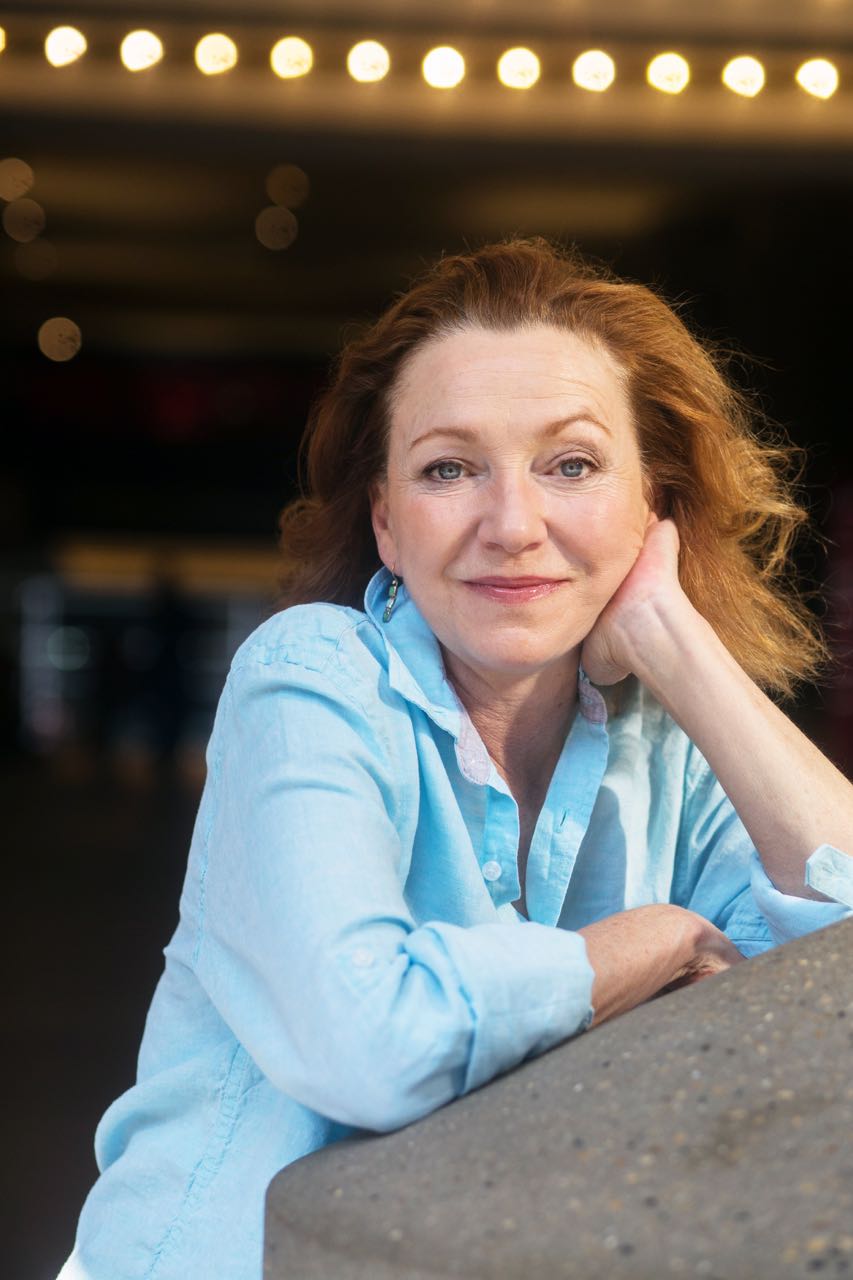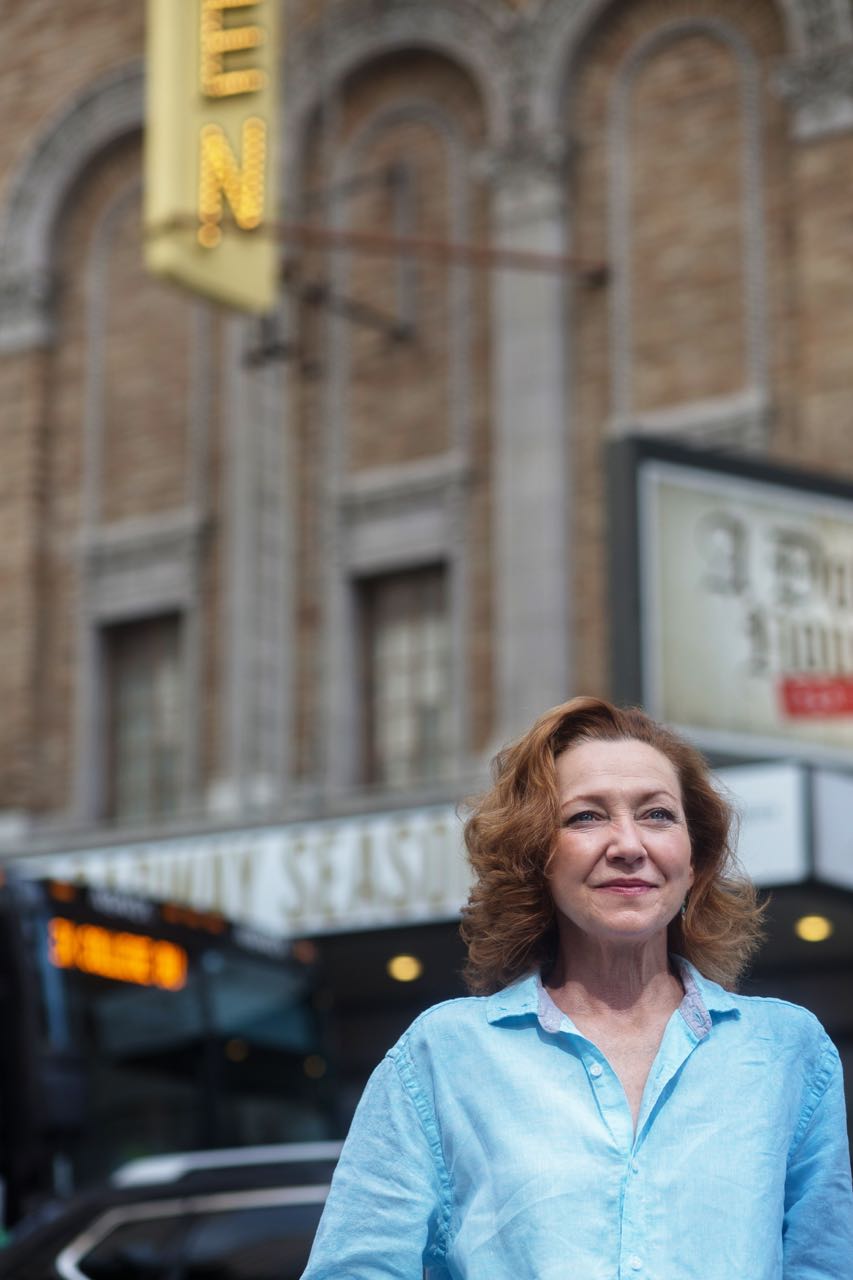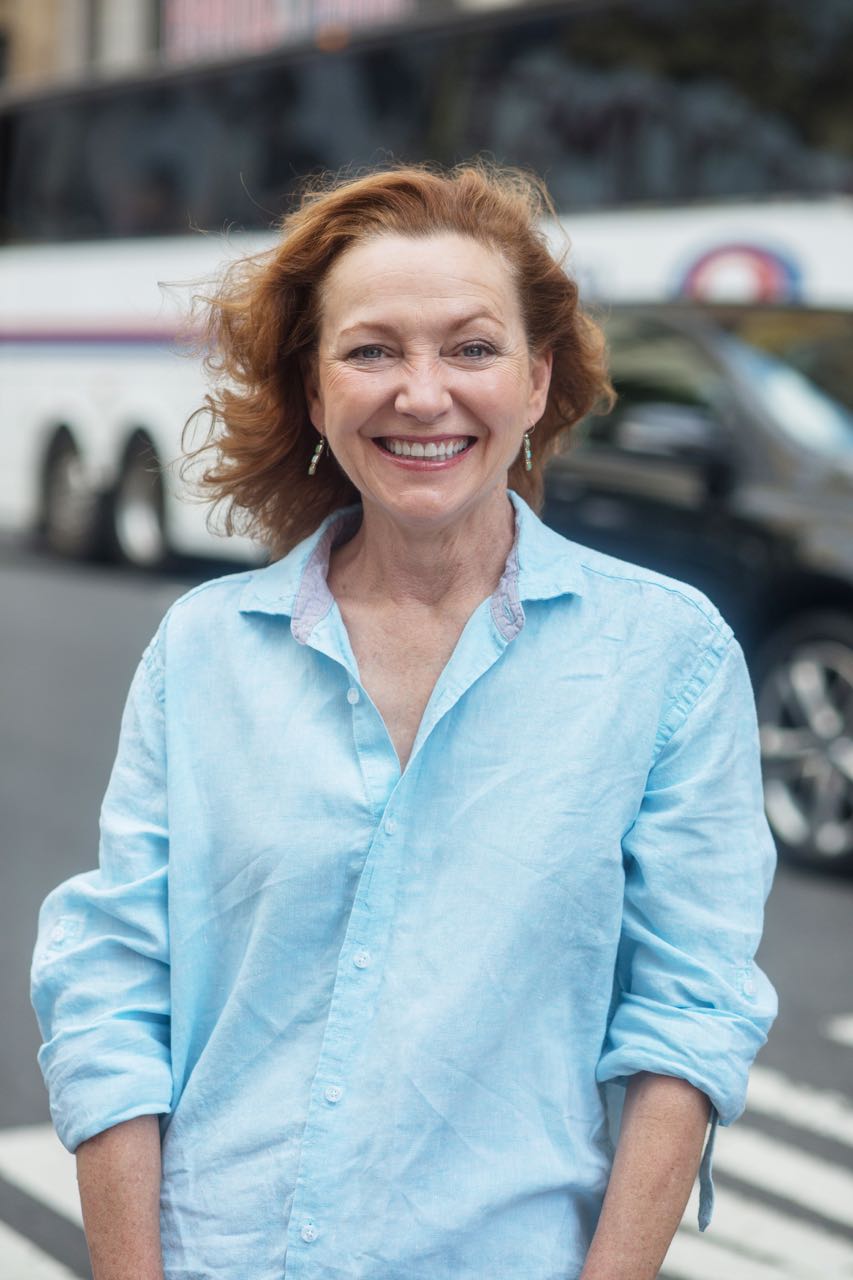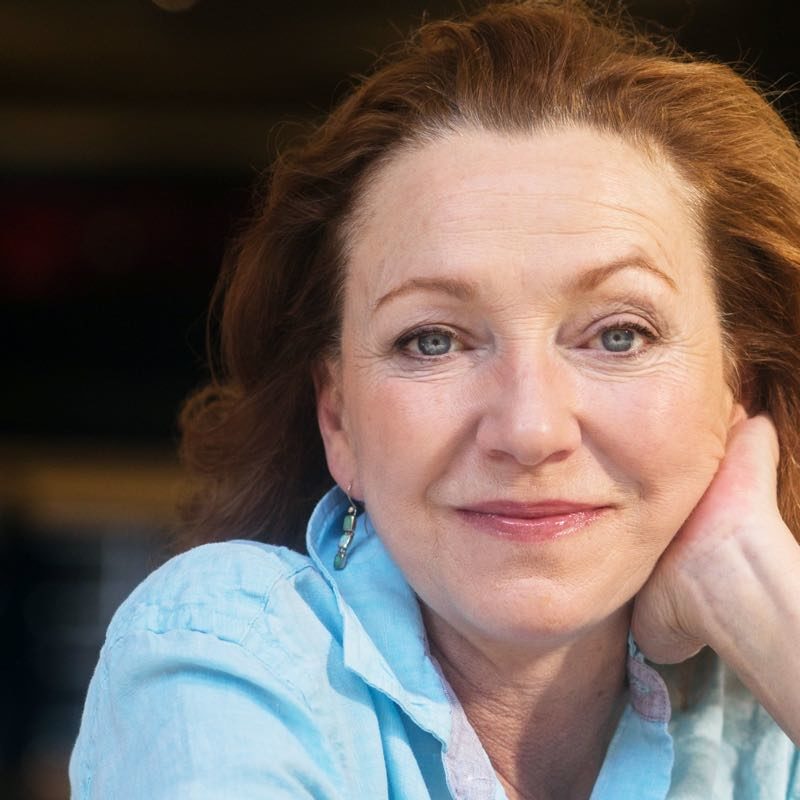Julie White on “A Doll’s House, Part 2”

Written by Victoria Myers
Photography by Tess Mayer
September 5th, 2017
At the end of July, Julie White stepped into the role of Nora in Lucas Hnath’s A Doll’s House, Part 2 directed by Sam Gold, which is a sequel to Henrik Isben’s A Doll’s House. The play received the most favorable reviews of any new play on Broadway in the 2016/17 season and was nominated for a Tony Award for Best Play. It is worth noting that although the creative team for A Doll’s House, Part 2 is all male, it was the only play in that category to have such a singular female protagonists. Nora is, indeed, a complicated juggernaut of a character, and one that seems right up Julie White’s alley. She previously won a Tony Award for Best Actress in a Play for her work in The Little Dog Laughed, and other recent theatre work includes From Here Up, Airline Highway, and Sylvia. After she’d been performing the role of Nora for a few weeks, we sat down with Julie to discuss her process, playing an unapologetic woman, the pressure to be likeable, and more.
Take me through your process of how you prepared for coming into the role.
It’s more truncated and it doesn’t feel like you get the preview period before you open, it just feels like you go straight to opening. So I knew it would be shorter, and I knew that I had a lot to say, and I couldn’t spend a lot of that three weeks just learning my lines. One of my neighbors has a son in high school, and we always go see his high school plays, and I called him, Max, and was like “Max, who do you know that would do the tedious job of running lines with me,” and he recommended a lovely girl named Catherine and she came over for a couple of weeks beforehand, every couple of days. So I was able to start off being able to stand up and rehearse and never hold the script in my hand. I still felt so far behind. It was kind of a scary process.
Do you normally like to be off book before you go into rehearsals?
Not really. I really don’t, because I feel like you learn it as you’re figuring out what it is and why you’re saying everything and where you are in the story. Memorization is not a problem for me, so I usually spend the first couple of weeks stumbling around. Usually, the first week is at the table talking about the play, figuring out relationships. Then the second week you’re up on your feet, you’re blocking it, you’re stumbling around with the script in your hand. Then the third week it’s just gotten into your head, you know it, and that’s when it starts coming together. But for this, that third week was dress rehearsal on the stage, done.
What else did you do to prepare? Did you find yourself doing a lot of other types of things to make decisions about the character?
No, I felt like I needed to wait until I met Stephen [McKinley Henderson] and Erin [Wilhelmi] and was working with Jayne [Houdyshell], because you’re developing things with other characters. I did go back and re-read A Doll’s House. You can go now to YouTube and watch a whole manner of actresses slamming the door; there are many different versions of that scene online, so I watched a lot of them. I read different actresses’ interviews on playing Nora, because I’ve just found it interesting to think about who Nora was when she left and who she is now, 15 years later, and who she will probably be 15 years in the future. Lucas [Hnath] said a really great thing to me: “At the beginning of the play, she thinks that she has climbed the mountain, but by the end of the play she realizes that she has only made it to base camp and the mountain is still in front of her.” So I just loved that.
Did you find it was a different type of process since the play is not a revival, but you are playing a character that there’s been so much written about, and a version of her has been performed so many times, so many ways? Fid you find that affected your thinking about it?
Definitely. Although, in the play, the very cheeky thing that happens is there is a definite nod to the original play, but it’s a totally unauthorized sequel and it’s set in some weird land where we communicate as we communicate today, but in this vaguely Victorian world. The things that Nora is saying in this play are things that we might say to each other, but we have slightly different words for it, we talk about the male gaze and we talk about the patriarchy and what she talks about is voices in her head that sounds like her father or her husband or the pastor. Or she talks about this thing men do of standing in front of women and looking down at them and telling them how the world works—well, that’s mansplaining to us now. Nora is like a prototypical feminist, so she’s seeing these things without anyone helping her see them. I think she’s very visionary, in the way Lucas imagines her, and that’s fun to play. I’m working now on not apologizing, not ever letting Nora be apologetic in the play, because it’s my nature as a woman and as a person to feel bad for Torvald that he clearly is very shaken up. My tendency is to want to be like “Hey, I’m sorry, should I leave and come back later,” but maybe Nora’s more like, “Okay, can’t deal with this now, so I can leave and I’ll come back later.” She’s more business-y than I am. I’m three weeks into it, so the process is really percolating along. It’s a fun time to come and see a show because stuff is just bubbling up right now.
What was it like coming into a show where there have been decisions already made in the piece about who this person is and who she is in relation to the other people in the play?
That part of it was slightly difficult for me because I wanted to make all new decisions, and in some cases I have, and in some cases I’ve decided to think I’m grateful for the shorthand. It’s like “Thanks, you tried it that way and it didn’t work, so I don’t have to.” Apparently, they had an experience through their preview process where, when the play became slow and people were really carving out those long speeches and trying to illustrate all the points, it didn’t work very well. You lost the audience. The audience got ahead of it because there’s nothing that Nora is saying that people haven’t heard. So I’m just tearing through it, I’m really flying through it, at the suggestion of the director, and I trust him.

With the character, what was your first way into her? Did you look for ways that you and she were similar, or ways that you were different?
I just start at the beginning and start to feel her, start to try her on and feel who she is, and start wearing her around. There are parts of me and there are parts of her, and now probably parts of her that are hopefully getting to be parts of me because she is kind of inspiring to play. She’s pretty great.
Was there one part of the character that you had the most trouble hooking into?
[What] I was touching on before is Nora’s unapologetic belief that what she did was right, including leaving her children, and that was a little hard to get my mind around because I have been a single mother. The way the world is now, if a man and woman divorce, it’s not one or the other. Nora didn’t have a choice. She wasn’t going to be able to co-parent with Torvald, and she had no skills or money or her own or abilities to support the children. So she made the decision that she was leaving them with Torvald, and that was that. It was incredibly difficult, but she felt it was best. I explain this in the show and I explain it without a lot of emotion. It’s just, “This is what was best.” That’s a hard one for me to get, and I think it’s where I feel a lot of people in the audience be like, “She did what? That’s terrible.” It is what it is. Men often, for a cause if they are true believers, do not stay at home and take care of their children. They go off and do the work that they are compelled to do in the world. When you really have a calling like that and you are really called, then there are things you give up and things your family gives up.
Do you think part of what makes that so tricky is that you have the contemporary language matched with the period-ish setting?
Lucas decided to write this thing in this way that feels so contemporary, and then Sam decided to stage it in this kind of weird postmodern world where we’re not in a realistic setting of the house. It’s cool and it’s hip, but it’s in some ways distancing, I think. Lucas is asking us to really think about this stuff.
Does the stylized nature of the piece present any challenges for you?
Yes, and it is difficult. I’m still working on being and feeling really emotionally connected and rooted during the times when I’ve been directed to come and stand at the front of the stage and face out while the person I’m talking to is sitting behind me. That is a disconnect. It’s like he’s [Sam Gold] using placement onstage like camera lenses, which is very clever but it takes a lot of concentration to keep your emotional connectedness. We get that on stage from reacting to each other. There’s a long explanation that Nora makes at the end of the play about why she really feels that she’s never going to have a relationship, why she’s best by herself. I’m telling it to Torvald, but he’s sitting behind me, so I keep going back and touching his foot which is right there next to me so that I can keep connected to him, as if I’m making eye contact. I just keep touching his foot.
The play is also very funny. How do you work on shaping those moments?
Funny kind of comes naturally to me. I see the funny in people and in things and in the language. I think in this play in particular, it’s not schticky. The first scene, with Jayne Houdyshell, is especially funny and we tend to definitely play over the laughs. You can laugh, but we’re not going to let you hijack the play, we’re going to keep going and then surprise you. So definitely we try to never ask for a laugh in this show. I remember when I saw it I was like, “This shouldn’t be funny. But this is funny.” It’s weird. Also thinking about Nora, she’s kind of a monster but I kind of love her.
Let’s go back to talking about women and likeability. How has it been for you to really explore those aspects of the character, especially in something where you also know it’s funny?
To me, what is often funny is a person who’s in over their head in some way. People struggling is generally funny. So the nature of Nora’s struggle is what I’ve got to find because it’s not out of weakness. It’s like she can’t get what she wants, but she doesn’t give into it. People tell her that they’re mad at her, and she’s like, “Gotcha, great, okay. But what I need is this.” She doesn’t stop and say, “Oh, I’m so sorry that you’re mad, but what I really need is this.” She’s so unapologetic. She tells the story about just taking two years off from speaking in order to figure out what her own voice sounded like, which is quite the sacrifice and that’s tough. So I think finding that super strength of a true believer and someone who is really called up to the mountain to get the Ten Commandments. She’s crazy like Moses. But she does like her pretty clothes.
I was so surprised when I first went to my costume fitting that her dress was so fancy, and that she still had all the Victorian trappings. I think probably 15 years past the play she will be in something much plainer. She’ll be in some sort of caftan and flat shoes. She won’t be wearing those heels. She just wasn’t there yet, she couldn’t see it. Already the things she’s able to imagine are so extraordinary that it’s like “Wow, it can even be more Nora, you can actually change.” I think of her like the novelist Tom Wolfe—he was always dressed like a dandy, and did a lot of social satire from the sidelines. That’s what she has got. She’s this celebrity writer on women’s issues, and created a series of books, like the Twilight of the time, where they all read about this wonderful woman who’s left her family and then dies of consumption. But now she’s realizing, “Oh, I can’t stand on the sidelines and plummet. I have to go change policy. I have to change the laws and that may mean getting arrested, it may mean bringing lawsuits.” It’s just cool to think about. The last line of the play is about the future, she says, “I just hope I live to see it,” and I saw the play soon after our election. I was so sure the election was going to be this amazing thing I’d been waiting for all my life: to see a woman be President of our country. So it feels like it’s very resonant for a lot of women to see it, and that last line especially.
In terms of what you were saying about Nora’s unapologetic nature, did you find that anything changed in how you were playing it once you got in front of an audience? Did their reactions affect your internal thoughts about it?
No, I don’t think so. I think there are individual performances where I can feel this is Team Nora out there. Then I’ve had a Sunday matinee where they were Team Torvald—when he said, “Easier for you to leave than to stay and tough it out with me,” and they all clapped. I was like, “Oh, yikes.” But I don’t think in terms of that when I’m preparing for something. I want to make my points, I want my character’s points to be clear, and I hope I’m doing that.
I recently brought this up in Celia Keenan-Bolger’s interview. I remember once an actress telling a story about how during rehearsal for a play the director told her, “We need you to tone it down a little because the audience needs to like you, we need to get the audience on your side more than we think they will be with the way you’re playing it now, because you’re too angry.”
I have heard that in the course of my career, or thoughts to that effect. I always think, just don’t worry about it. I’m very likable on stage and just fuck off. What’s so nice about this particular group, and Sam and Lucas, is they aren’t concerned with that at all. They really are fine with pushing anybody’s buttons. They just want to tell the story of this person in this way. But women, yes, we’re always supposed to be likable, we’re supposed to smile. Today’s performance was dedicated to Miss Taylor Swift, because Swifty just killed on the witness stand up there [in her lawsuit against a radio host for sexual misconduct]. We listened to “Shake it Off,” and just went out there and kicked it in the teeth. Her testimony was so impressive, and I bet she had some people help her and coach her. It was so on the money to never apologize, and never let him blame her. She called him on it every time. Well done. In a week full of bad news, Taylor was very good news.
Do you find with being in the entertainment industry that the likability thing is even more of a factor than in other fields?
I don’t know, it’s the only business I’ve ever been in, but my daughter works in tech. She’s part of the United States Digital Service and heads up teams that go in to try to fix the tech within the really aging infrastructure of our federal government. She was an Obama hire, now she may not be there for long, but for now, she’s still doing good work inside our government. We’ve had a lot of talks about the Google memo. It’s not the same thing as likability, but the wrath that women get in her business is something different, which is, “You’re too emotional, you’re not analytical enough,” as if emotional intelligence is not intelligence. In show business, they want the prettiest girls, there’s that. Maybe comedy is the worst. At least in show business, they still need somebody to have sex with in the movie, whereas in the comedy they can do whole big comedies with just a bunch of guys. But not so much anymore. I am a glass half full kind of person, and a lot has changed since I was a girl, and a lot for the better. Are we as far as I thought we would be? No. But is it better? Yes.

If you went back 10-15 years, back then, would you have thought in 2017 things would be farther along than they are for women in the entertainment industry?
I know there’s so far to go, but it is so much further along than where it was. When I did The Little Dog Laughed Off-Broadway, one of my costars was Zoe Lister-Jones. What Zoe has done in these ten years is so amazing, and she just recently had a movie out in June called Band Aid. She wrote it, she produced it, she directed it, and she hired an all-female crew. It was amazing. I wouldn’t have ever thought like that when I was her age—I wouldn’t have thought that was something I could do at that age. Is some shit still the same and really stupid and crappy? Yes. But there’s ways that it also has improved a great deal.
Childcare is something that comes up a lot, and that seems like it’s still sort of a mess in theatre particularly.
I had my kid when I was 25 and was divorced when I was 28, so then it was just me in the city with a three year old. I would do plays. A play was kind of one of the best things when you have a kid that’s not a baby, but still a little one, because they’re portable. They’re not really as difficult as one thinks. They can go a lot of places with you, or you’re only working a few hours a day, it’s not like you’re doing an 80-hour workweek at a tech startup. Of course, if you’re doing a one-hour TV show or a film, it does get really hard. But usually if you’re in a one-hour TV show or a film, you can afford a nice helper to be with you and to bring the baby to your trailer and that sort of thing. If you’re trying to do theatre and regional theatre, you’ve got to have help. There were a lot of people that helped me. I had helpers, whether they be friends that would babysit, or regular babysitters. But it always was very hand to mouth, and getting a television show [Grace Under Fire] that coincided with my daughter starting first grade, which was when we needed to settle down and stay somewhere for a while, was very serendipitous. But Americans have no universal childcare or health care.
Going forward, what’s something that you think you would like to see in terms of the amount of female characters or types of female characters or the way we talk about female characters in theatre?
There are some great women directors all making their way. But it does sort of feel like producers don’t want to give women directors the big shot. They seem to get a shot at Broadway less often than others, I’d like to see more Leigh Silverman directing on Broadway. I’d love to work with more female directors. I’ve found I don’t get to work with female directors as often as I would like. I would really like to do that. Because that’s the top dog position, and it just infuses everything—I love working in that energy of female directors. As a kid, I never even thought about directing. It was unheard of for me. But now there is a generation of young women who are and do and will, and that will change as well. We just have to permeate the whole thing: more women writing about it, more women critics. The more influential female voices there are all around, the better.

